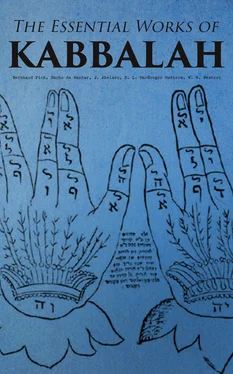Albam.
| A, |
B, |
G, |
D, |
H, |
V, |
Z, |
Ch, |
T. |
Y, |
C, |
| L, |
M, |
N, |
S, |
H, |
P, |
Ts, |
K, |
R, |
Sh, |
Th. |
By which the alphabet is divided into two equal parts, and the first letter interchanged with the eleventh, the second with the twelfth; thus Isaiah vii: 6, the word T B A L Tabeel becomes Ramla, the King of Israel. Sometimes letters of a word may be transposed as to compose another word as Mlachy (my angel) may be made Michael (the angel Michael).
Thaumaturgic Kabbalah is founded on the assumption that a certain virtue or energy is inherent in the words and letters of the Scriptures, which on the pronunciation of them with a specific and steadfast purpose will communicate itself to spiritual or heavenly powers, of which those names, words, and letters, are the symbols, producing effects which to those who have no knowledge of the occult power of vibrations would be altogether deemed incredible. Yet in our own experience have we met with instances of the occult power of words and symbols of a most extraordinary character, the results of which were most pronounced and beneficial. Kabbalists strongly affirm that by such means effects are produced in the higher or noumenal world which become expressed and manifested in the changes sought to be accomplished in this our phenomenal and lower life. It was and still is an article of Jewish belief that he who can rightly pronounce the Tetragrammaton. or holy name, is able to do wonders and produce miraculous effects. The parts of Scripture employed for this purpose are those which contain or are by the preceding modes made to be expressive of the divine names and those of angels and the Sephiroth, each of which corresponds with a part or member of the human body. The interrelation of these names is as follows:
| Sephiroth |
Divine Name |
Angels |
Parts of Body |
| Kether |
Ehyeh |
Chaioth |
Brain |
| Hochma |
Jah |
Ophanim |
Lungs |
| Binah |
Jehovah |
Arelim |
Heart |
| Chesed |
El |
Chasmalim |
Stomach |
| Geburah |
Eloah |
Seraphim |
Liver |
| Tiphereth |
Elohim |
Malachim |
Gall |
| Netzach |
Jehovah Zabaoth |
Tarsheesim |
Spleen |
| Hod |
Elohim Zabaoth |
Beni Elohim |
Reins |
| Yesod |
El Chai |
Cherubim |
Genitalia, Mas. |
| Malkuth |
Adonai |
Ishim |
Genitalia, Fem. |
In the cure of diseases, the name of the heavenly power is invoked which corresponds to that part of the body affected, or the member to be healed. These names are sometimes, together with what are termed the signatures of the angels, inscribed on kemeoth or amulets of various kinds, and constructed according to certain rules, which Paracelsus in his magical works has outlined. They are also given in such Kabbalistic works as The Sixth Book of Moses, Shemosh Tehillim, and others. That part of practical Kabbalah relating to the conjuration and evocation of good spirits and angelic beings is denominated Theurgy or White Magic. That referring to the invocation of evil powers is called Goety or Black Magic, is found in the frightful grimoires of the Middle Ages. It must, however, be admitted that the most learned and enlightened Kabbalists ignore this latter entirely, holding it as an abomination, and denounce both the study and practice of it as having no connection whatever with the sublime Kabbalah elaborated by Rabbi Simeon.
Of the many learned Kabbalists who have written on this subject, the best and most esteemed are Rabbi Nachmanides, whose Shoshan Sodoth, "The Lily of Secrets," is a profound treatise on the powers of letters, names, and numbers. Gikatilla, author of Ganath Egos, "The Garden of Nuts," an introduction to the doctrines of Kabbalah, also of Sheaarey Zedek, "The Gates of Righteousness on the ten Sephiroth." On Kabbalistic philosophy the greatest and most famed are Moses Corduero, who composed Paredis Rimmonim, "The Garden of Pomegranates," and Isaac de Luria, who spent his whole life in the study, teaching and exposition of Kabbalah. His great work, entitled Etz Chaim, "The Tree of Life," edited and published by Vital, will ever remain a monument of his learning and knowledge of Kabbalistic Science. The Shefer Tal,, Shower of Dew," is a well-known and excellent work by Rabbi Shabbethai Horowitz, and is often referred to as a text-book by students, as also Chesed le Abraham, "Mercy to Abraham," by Abraham Asulai, a most remarkable work in seven gates or chapters, dealing with the mysteries of the law, the microcosm, hell, paradise, the transmigrations of the soul, demonology and guardian angels, hidden powers and forces, etc. Another important work, being the first printed book on Kabbalah, is Derech Emuna, "The Path of Faith," by Meir ben Gabbai, and treats in the form of dialogue on the Sephiroth, which will eventually appear in "The Word," for the first time in English. And last, though not least, is the Zohar itself, which, when first published in Europe by Leo de Modena in the twelfth century, produced a wide and profound impression in the learned world, including popes, ecclesiastics, professors in all the most noted universities. Scholars everywhere read and studied it, through whom its teachings and philosophy were adopted as appears in many theological works, published in that and the succeeding centuries, both Christian and Jewish. The chief non-Jewish authors of works on Kabbalah are Picus de Mirandola, "Conclusions Kabbalisticce"; Reuchlin, "de Arte Kabbalistica"; Brucker, "Historia Philosophiae"; Rosenroth, "Kabbalah Denudata," comprising Latin translations of large portions of the Zohar, with commentaries, glossaries, and a large mass of interesting information on the transcendental philosophy of the Jews; Basnage, "Historie des Hebreux," which has been translated into English. The works of Joel, and Jost, on Jewish sects, in German, are excellent for reference on Kabbalistic history. A French "Systeime dala Kabbalah," in French, is well worth reading. Count Mac Gregor Mathers--Kabbalah Unveiled--which, though embracing only a part of the Zohar, is a most excellent work, especially the introduction and very learned notes, which no one but a great Kabbalist could have compiled. To all these must be added the Edipus Egyptiacus, a really stupendous work by Athanasius Kircher, a most learned and profoundly erudite scholar, whose multifarious works comprise twenty-three folio volumes, chiefly on philosophical, scientific and literary subjects.
Having now emerged from out of the mazes of this labyrinthine subject of Kabbalah, the question may be asked, how is it that a work like The Zohar has been suffered to drop out of popular notice so as to become comparatively unknown, except to a few ardent and zealous students. During the last century a great amount of interest was exhibited by savants and scholars in the science of comparative Religion and the sacred books of all nations, especially those of ancient Persia, Egypt, and India, were subjects of profound researches and investigations by learned Orientalists such as Max Muller, Whitney, and a host of others, all noted for their philosophical and literary attainments. But The Zohar, the Book of Light, has been passed by, ignored and unappreciated, so that its existence is scarcely known. What is the reason for such neglect, so strange and anomalous? Among the many reasons that may be advanced in explanation of this universal neglect is the fact that the study and comprehension of this book demand, from students in general qualifications they do not possess, viz., a knowledge of occultism and an acquaintance with those correspondences and analogies which are an essential sine qua non in the acquisition of spiritual science and learning. The natural man, as St. Paul observed centuries ago, however learned and advanced in art and science, cannot understand the things of the spirit, nay, he will frequently have to quit or rid himself of many preconceived notions and prejudices, the result of his learning, and become as teachable as a little child ere he eau take a single step or advance in spiritual science and philosophy. The majority of students in public colleges and institutions, imbued with the commercial spirit of the age, are actuated in their labors and studies greatly by motives of gain, and the acquisition of wealth and position, are content and willing to follow in the world's train instead of becoming its leaders, its guides, and directors to a higher and truer knowledge of the philosophy of human life and existence. It has not always been so. Great and learned and true men there have been, who in the study of The Zohar found a philosophy which expanded their minds and purified their natures from the defilement of those mercenary motives, which are at the present time so rampant and prevalent in all classes and grades of society. There are, however, looming up in the mental horizon of the world, indications of a deep and earnest desire and craving after a learning that shall ennoble human nature and not lead it into bypaths of error and illusion. Men are observing and detecting in the study of past systems of religion and philosophy something that was true, and therefore worth retaining and cherishing, and also recognizing that the end, the aim, and object of all of them, was the renovation and purification of human nature and its exaltation to a higher plane of thought and experience. This was their chief raison d’etre as formulated and expressed in The Zohar. In it, as in a deep mine, are to be found embedded veins and nuggets of valuable truths more precious than gold or rubies, but which must he delved for and excavated as miners toil and delve for gold and other minerals. All knowledge that is worth having, that which enriches and endows us with a wealth of power and strength to conquer nature and attain the goal of our destiny, implies labor and toil protracted and ofttimes wearying; involves self-sacrifice and self-denial, frequently painful and trying, but when acquired, gives us the right to take of "the tree of life" whose fruits and leaves in the symbolic words of the Apocalypse are for the healing of the nations. This knowledge it is that frees us from the trammels and bondage of sensual desire and indulgence and brings in its train self-conquest, the greatest of all victories, the noblest of all human achievements. Some years ago, a great general lay mortally wounded on his pallet bed within his tent, surrounded by brother officers and comrades on many a hard fought field of battle. The sands of life were fast running out. To cheer his last moments some one whispered, "Bring the record of his victories and read it to him ere he leaves us." It was brought and read. Scarcely was it finished when the departing warrior with a painful effort raised himself up on his elbow and said:
Читать дальше












